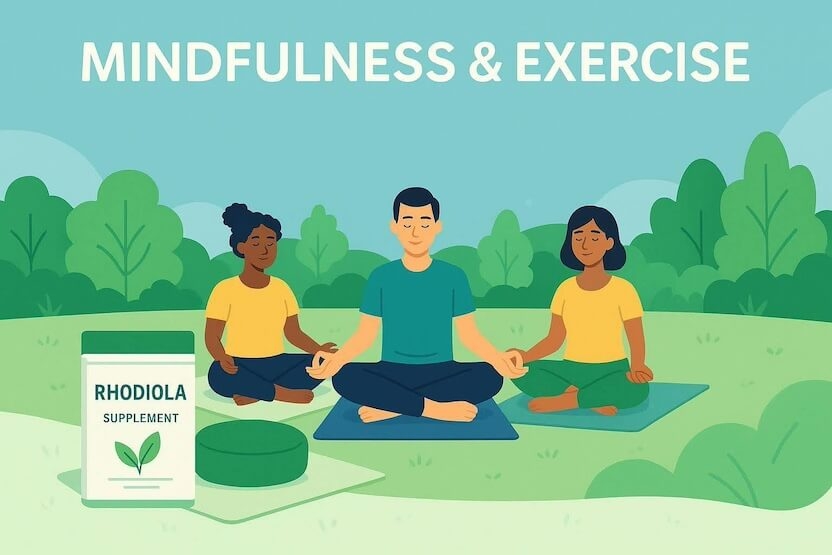Last update: July 7, 2025
7 minute read
Rhodiola For Stress: How Does This Adaptogen Improve Mood, Reduce Fatigue, and Improve Resilience?
Discover how Rhodiola for stress relief supports mood improvement, fatigue reduction, and overall resilience with clinically backed adaptogenic benefits.

By Derick Rodriguez, Associate Editor
Edited by Dr. Dimitar Marinov, MD, RDN, PhD

Stress seems unavoidable in today's fast-paced world, and many of us are desperately searching for trustworthy ways to manage it effectively. Adaptogens like Rhodiola Rosea have been studied for potential benefits in stress management, mood, and cognitive performance, although the evidence is still emerging.
But what makes Rhodiola special compared to other popular stress-relief herbs like Ashwagandha or Holy Basil? And how do you pick a supplement that truly gives optimal results?
In this article, we’ll explore the research, benefits, and practical steps for adding Rhodiola to your wellness routine, so you can make an informed decision for a calmer, clearer you.
Key takeaways
- Rhodiola Rosea is a potent adaptogen that helps your body adapt to physical and psychological stressors
- Key active compounds may influence neurotransmitters involved in the stress response
- Combining Rhodiola supplements with exercise, meditation, and mindfulness can maximize stress relief and improve quality of life
Understanding Rhodiola Rosea
Rhodiola Rosea, also known as golden root or arctic root, naturally thrives in the harsh, cold climates of Europe, Asia, and North America. Its resilience in these tough conditions mirrors its traditional use to battle fatigue, improve work performance, promote positive mood and fight altitude sickness across Russia and Scandinavia.

Classified as an adaptogen, Rhodiola works by helping your body adapt effectively to many stressors—physical or psychological—without causing harm or imbalance. Adaptogens like Rhodiola are valued for their unique ability to help your body keep balance under stress, supporting both mental and physical endurance.
Years of medicinal use
Rhodiola is so resilient that it grows in some of the coldest, highest-altitude regions on Earth, like Siberia and Scandinavia, and has been used in traditional medicine for centuries in these regions.
Modern research indicates that Rhodiola may support stress adaptation and resilience by modulating neurotransmitters, supporting energy metabolism, and potentially improving your body’s resistance to stressors.
But wait—what exactly sets an adaptogen apart from regular herbs or supplements?
Adaptogens help normalize body functions, especially during times of stress, by targeting the hypothalamic-pituitary-adrenal (HPA) axis. Unlike stimulants, they don’t cause overstimulation or dependency.
The science behind Rhodiola’s stress-reducing effects
Rhodiola contains potent phytochemicals like rosavins and salidroside. These biocompounds play a key role in supporting crucial neurotransmitters like serotonin, dopamine, and norepinephrine, making sure your stress response is tightly regulated and optimal.
In fact, more than 140 active ingredients have been found in Rhodiola rosea's roots, with rosavins and salidroside regarded as the most potent.
VitaRx Tip
The term "adaptogen" is an unofficial term, which was first coined by Russian scientist Nikolai Lazarev in 1947 to describe substances that help increase your body's nonspecific resistance to stress. It is not officially recognized as a medical term to this day.
Below is a table outlining some of the best-studied phytochemicals in Rhodiola rosea and their corresponding biological activities:
Group of Compounds | Compound | Notable Bioactivity |
|---|---|---|
Phenylpropanoids | Rosavin, rosin, rosarin (rosavins) | Antioxidant, neurostimulant, adaptogenic |
Phenylethanoid derivatives | Salidroside (rhodioloside), tyrosol | Adaptogenic, stress modulation |
Flavonoids | Rhodiolin, rhodionidin, rhodionin, rhodiosin, tricin | Cognitive support, antioxidation |
Monoterpene derivatives | Rosiridol, rosiridin, rhodiolosides A–E | Antimicrobial, cognitive support |
Triterpenes | Daucosterol, beta-sitosterol | Anti-inflammatory, immunomodulatory |
Phenolic acids | Chlorogenic acid, hydroxycinnamic acid, gallic acid | Antioxidant, free-radical scavenger |
Still scratching your head about why antioxidants matter when it comes to stress? Chronic stress increases oxidative damage in your cells. Antioxidants like those in Rhodiola help protect your cells and brain from this damage, supporting mental clarity and resilience.
Clinical research supports Rhodiola's reputation: many studies have suggested its stress-relieving, mood-supporting impact. For instance, a 2015 study suggests its ability to support mood and cognitive function in some participants.
How quickly can you expect to feel improvements with Rhodiola? Some studies showed measurable benefits within 1–2 weeks, especially regarding reduced fatigue and improved mental performance.
Key studies on Rhodiola and stress
Study | Dosage | Duration | Findings |
|---|---|---|---|
Darbinyan et al., 2007 (2) | 680 mg/day (340 mg twice daily) | 6 weeks | Reported reductions in overall stress compared to placebo |
Cropley et al., 2015 (1) | 200 mg/twice daily | 14 days | Improved stress recovery, reduced feelings of fatigue |
If you’re asking yourself, are these dosages safe for most people? Most short-term studies report few side effects at common doses, with mild symptoms such as headache or insomnia occasionally noted.
In addition to emotional and cognitive support, Rhodiola’s adaptogenic effects may extend to the physical, like improving stamina and resistance to exercise-induced fatigue.
But wait—does this mean athletes or people with physically demanding lifestyles can benefit too? Yes. Rhodiola is often used by athletes to reduce recovery time and physical fatigue without acting as a stimulant like caffeine.
Comparing Rhodiola Rosea with other stress-relief supplements
While other adaptogens like Ashwagandha and Holy Basil offer their own merits, Rhodiola is notably unique:
Supplement | Active Compounds | Primary Benefits | Effectiveness |
|---|---|---|---|
Rhodiola Rosea | Rosavins, Salidroside | Stress change, positive mood, reduced fatigue | Clinically supported stress reducer |
Ashwagandha | Withanolides | Stress support, sleep improvement | Effective, common supplement |
Holy Basil | Eugenol, ursolic acid | Stress relief, anti-inflammatory | Mild-to-moderate effectiveness |
Here’s a side-by-side comparison: Rhodiola tends to give a subtle energizing effect and is best for those seeking both mental focus and resilience to stress, while Ashwagandha often works as a calming, relaxation-promoting aid. Holy Basil is typically milder but brings anti-oxidative potential.
VitaRx's premium Rhodiola supplement is crafted to precise standards, standardized to contain exactly 3% rosavins and 1% salidroside—making sure optimal quality, purity, and strength to best support your wellness journey.
Not sure why standardization matters? Standardization ensures you get consistent, effective levels of the active ingredients found to give stress-relief benefits in clinical trials.

Get your personalized vitamin recommendations in less than 3 minutes.
Get your personalized vitamin recommendations in less than 3 minutes.

Adding Rhodiola Rosea to your wellness routine
Ready to add Rhodiola to your daily routine? Here’s how to do it effectively.
To get all the benefits of Rhodiola, look for high-quality supplements standardized to 3% rosavins and 1% salidroside. A typical dosage ranges between 200–600 mg per day, ideally taken in the morning or early afternoon. Rhodiola is generally regarded as possibly safe for short-term use (up to about 6–12 weeks) at typical dosages.
Still wondering when’s the best time to take Rhodiola? Morning or early afternoon is ideal to avoid sleep disturbances, as some people find it mildly energizing.
Combining supplementary Rhodiola with routines involving regular exercise, meditation, and mindfulness practices can give compounded, strong stress-relief results. Together, these practices clearly improve overall resilience, mood, and quality of life.

Rhodiola’s ability to control stress hormones, protect the brain from oxidative stress, and improve recovery from physical and mental fatigue makes it a valuable addition to any stress management toolkit. Research continues to support Rhodiola’s promise as a natural way to support a calm, focused mind and resilient body.
Curious if there are any people who should avoid Rhodiola? People who are pregnant, breastfeeding, or on medications for mood, blood sugar, or blood pressure should consult their healthcare provider before starting Rhodiola, as interactions are possible.
Frequently asked questions (FAQ)
Here are some of the most frequently asked questions about Rhodiola for stress.
Final thoughts
Rhodiola Rosea stands out among adaptogens due to its powerful, clinically supported stress-reducing and mood-supporting benefits. We recommend choosing a high-quality Rhodiola supplement—ideally standardized to 3% rosavins and 1% salidroside—and pairing it with habits like meditation and regular exercise.
Doing so, you can support your overall resilience and mental well-being. Could Rhodiola be the missing piece in your wellness puzzle?
Disclaimer: Always consult with a healthcare professional before beginning any new supplement regimen, especially if you are pregnant, nursing, have known medical conditions, or are taking medications.
Sources and references
Editor

Derick Rodriguez
Derick Rodriguez focuses on editing health and wellness-related content. With over half a decade of experience in the digital realm, Derick has developed a unique skill set that bridges the gap between complex health concepts and accessible, user-friendly communication. His approach is deeply rooted in leveraging personal experiences and insights to illuminate the nuances of health and wellness topics, making them more approachable and empowering readers with knowledge and confidence.
Fact checker

Dr. Dimitar Marinov
Dr. Marinov has years of experience in scientific research and preventive and clinical medicine. His publications in peer-reviewed journals are on nutritional status, physical activity, and musculoskeletal disorders among adolescents.
At VitaRx, we're not just passionate about our work — we take immense pride in it. Our dedicated team of writers diligently follows strict editorial standards, ensuring that every piece of content we publish is accurate, current, and highly valuable. We don't just strive for quality; we aim for excellence.
Related posts
While you're at it, here are some other relevant articles you might be interested in.

Get your personalized vitamin recommendations in less than
5 minutes.
Get your personalized vitamin recommendations in less than
5 minutes.






